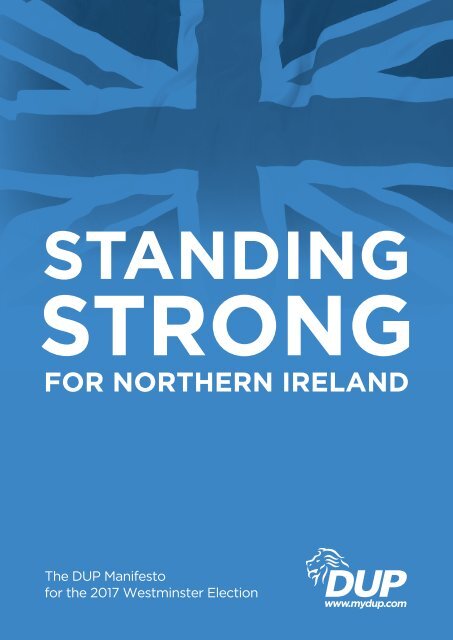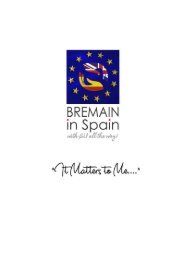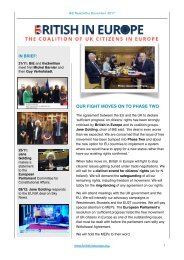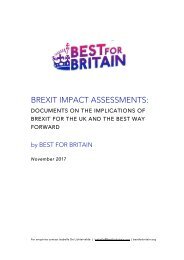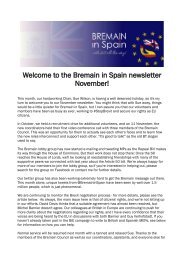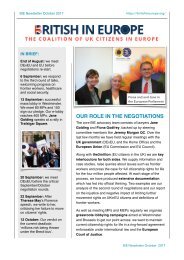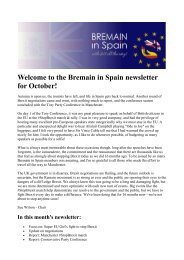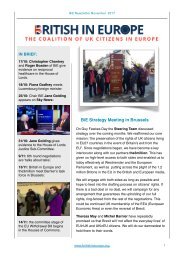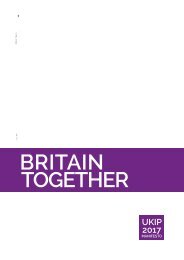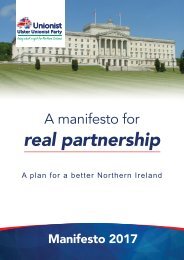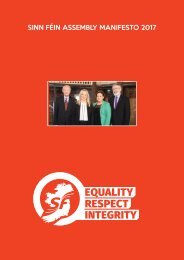DUP 2
Create successful ePaper yourself
Turn your PDF publications into a flip-book with our unique Google optimized e-Paper software.
STANDING<br />
STRONG<br />
FOR NORTHERN IRELAND<br />
The <strong>DUP</strong> Manifesto<br />
for the 2017 Westminster Election
Westminster 2017<br />
Westminster 2017<br />
Leader’s Message<br />
The General Election gives unionism the chance to get back on the right track.<br />
Be in no doubt, the party that has most Members of Parliament elected will be<br />
seen as the voice of Northern Ireland. The Prime Minister’s decision to hold a<br />
snap poll provides a basis to make the positive case for the Union.<br />
At this election, we seek a mandate for the Union that really<br />
matters – the Union with Great Britain – to make sure<br />
Northern Ireland gets the best Brexit deal and to reach<br />
an honourable and not a one sided deal to get the Assembly up and<br />
running again to deal with the real problems that are faced by people<br />
in their everyday lives.<br />
The choice at this election is clear. If you want unionism to be<br />
strengthened then you should unite around the strongest<br />
unionist party.<br />
Unionism needs its strongest team.<br />
Northern Ireland needs one strong unionist voice leading from the<br />
front to protect our place in the union and to get the best deal for<br />
Northern Ireland.<br />
We are that voice.<br />
We are proud to be standing strong for Northern Ireland.<br />
A vote for <strong>DUP</strong> candidates is the strongest unionist vote.<br />
Now, more than ever, unionism needs to speak with one voice.<br />
Make no mistake, elections matter. On this occasion our votes may<br />
not be required to help form a government at Westminster but the<br />
implications for politics in Northern Ireland could not be greater.<br />
Rt Hon Arlene Foster MLA<br />
Leader, Democratic Unionist Party<br />
What we need is a mandate for unionism, for a deal to get Northern<br />
Ireland back on track and for the restoration of the Assembly and<br />
Executive.<br />
How people vote at this election and how many seats we have will<br />
determine not just individual Members of Parliament but the shape<br />
and direction of our country thereafter.<br />
2<br />
3
Westminster 2017<br />
Westminster 2017<br />
Deputy Leader/Parliamentary Party<br />
Leader’s Message<br />
This Westminster election comes at a time of great importance for our country<br />
and for Northern Ireland. For the first time in decades, the powers of Parliament<br />
will grow. This growth means its importance to the lives of each and every one of<br />
us grows too. This makes it vital that we have a strong, united and clear voice to<br />
speak up for Northern Ireland.<br />
We need a ‘Team Northern Ireland’ on the benches<br />
of Westminster. Only the <strong>DUP</strong> offers the people of<br />
Northern Ireland the team that can maximise our<br />
influence. No other party will be large enough to break through and<br />
ensure Northern Ireland’s voice is heard loud and clear.<br />
Our job will not be to refight old battles, the people have spoken.<br />
It is our job to use our mandate and our influence to get the best deal<br />
for Northern Ireland on the issues that matter like the Budget and<br />
leaving the EU.<br />
In the previous parliamentary term, the <strong>DUP</strong> team used its influence,<br />
in public and private, for the benefit of people in Northern Ireland. For<br />
example, the fight to save working tax credits protected the incomes<br />
of 100,000 people here. We also used the previous term to develop<br />
positive working relationships that the <strong>DUP</strong> is committed to building<br />
on in the next term.<br />
On 8th June, a vote for the <strong>DUP</strong> team is a vote to send ‘Team Northern<br />
Ireland’ to Westminster. It is a team that has real influence and<br />
experience in speaking up for the interests and needs of Northern<br />
Ireland. It is this team and this party that is working and delivering<br />
for local people.<br />
At this election, we re-dedicate ourselves to doing it again.<br />
Rt Hon Nigel Dodds<br />
Deputy Leader, Democratic Unionist Party<br />
4<br />
5
Westminster 2017<br />
Westminster 2017<br />
1<br />
Restoring<br />
Devolution Now<br />
The Democratic Unionist Party believes that Northern Ireland needs a working<br />
Assembly and Executive as the best form of government for all of our people.<br />
Stormont is far from perfect but it is immeasurably better than what happened<br />
before or what would replace it. The progress we have made should not be<br />
easily cast aside to be replaced by uncertainty with power transferred to<br />
unaccountable Direct Rule Ministers.<br />
There are 5 pressing reasons why we need devolution restored immediately.<br />
• To help achieve the best deal for Northern Ireland as the UK<br />
leaves the EU – at precisely the time when Northern Ireland’s voice<br />
needs to be heard loudly and clearly the Northern Ireland Executive<br />
has not been formed. If we are to deal with the challenges and seize<br />
the opportunities that leaving the European Union presents then we<br />
need our own local Ministers lobbying London and Brussels.<br />
• To get a Budget put in place – Northern Ireland is in unchartered<br />
territory where senior Civil Servants are making public spending<br />
decisions and not elected politicians. Sinn Fein’s Finance Minister left<br />
post without proposing a Budget. Key public services and – most<br />
importantly – the people who rely on them, need a Budget to be set<br />
so they can get the support they need.<br />
• To progress much needed health reforms – our National Health<br />
Service faces unprecedented pressures. The <strong>DUP</strong> kick started much<br />
needed reforms aimed at creating a new model of health and social<br />
care and reducing bureaucracy and streamlining structures. Those<br />
reforms are now effectively on hold with challenges like waiting lists<br />
mounting. People should not have to wait any longer to have those<br />
reforms implemented and problems tackled.<br />
• To protect and improve our education system – the impact of<br />
not having an Executive in place is already being felt across our school<br />
system. Having an Executive up and running is critical to resolving<br />
the funding crisis facing our schools thus ensuring that we prioritise<br />
frontline funding for our schools so that all our children receive the<br />
best educational start in life. It is vital that we build on positive<br />
practical reforms in education.<br />
6<br />
• To attract investment and jobs – it is no coincidence that our<br />
record levels of inward investment have happened during a sustained<br />
period of devolution. Having stable structures at Stormont with local<br />
Ministers leading efforts to sell Northern Ireland internationally has<br />
helped us secure thousands of new jobs. Without devolution, all of the<br />
efforts to reduce our rate of Corporation tax will have been for nothing.<br />
Political stability is key to our future economic success.<br />
THE STRONGEST, MOST EXPERIENCED UNIONIST TEAM READY<br />
FOR NEGOTIATIONS<br />
Immediately after the General Election, we will enter another round<br />
of negotiations. The <strong>DUP</strong> will place the interests of the people of<br />
Northern Ireland first in those negotiations. We will not draw any red<br />
lines or put any roadblocks in the way of seeing an Executive formed<br />
straight away.<br />
It is absolutely imperative that voters use this election to not only<br />
send a clear message that they want to see Stormont restored but also<br />
give unionism the strongest possible hand in the talks. No other Party<br />
has the strength, unity or experience of delivering for unionism that<br />
the <strong>DUP</strong> possesses.<br />
Unionists remember what it was like in the past when Sinn Fein<br />
were able to advance their radical republican agenda in negotiations,<br />
aided and abetted by weak unionists. This all changed when the <strong>DUP</strong><br />
started to lead unionism. Since 2003, the <strong>DUP</strong> has slowly but surely<br />
regained ground for unionism culminating in the Stormont House<br />
and Fresh Start Agreements.<br />
Sinn Fein have sought to use their mandate at the last Assembly<br />
election to block the re-establishment of the Assembly, to demand<br />
a destabilising Border Poll and to push their agenda. It’s time for<br />
unionists to come out and vote so the real voice of Northern Ireland<br />
is heard. The <strong>DUP</strong> needs a strong mandate to stand strong against<br />
Sinn Fein’s demands.<br />
Immediately after the election on 8 June the negotiations aimed at<br />
restoring devolution will recommence with a view to establishing a<br />
new Executive by 29 June.<br />
We will enter these negotiations with a positive approach and a goal<br />
of seeing the Assembly and Executive restored.<br />
We will not draw any red lines or preconditions but will judge any<br />
potential deal against 5 core tests.<br />
1. Is the agreement likely to increase support for<br />
Northern Ireland’s constitutional position within<br />
the United Kingdom?<br />
2. Is the agreement fully consistent with Northern<br />
Ireland remaining a full and integral part of the<br />
United Kingdom?<br />
3. Is the agreement fully compatible with our British<br />
citizenship?<br />
4. Will the agreement result in better government<br />
and policies for the people of Northern Ireland than<br />
a return to Direct Rule?<br />
5. Is the agreement consistent with the mandate we<br />
received for our Assembly manifesto in March?<br />
For ease of reference we set out the 10 commitments for negotiations<br />
which were endorsed on 2 March.<br />
OUR 10 COMMITMENTS IN NEGOTIATIONS<br />
1. We will work to avoid Direct Rule and get local government back at<br />
Stormont as quickly as possible.<br />
2. Our demands in negotiations will be proportionate to those of<br />
Gerry Adams and Sinn Fein.<br />
3. As has been the case since 2007, we remain committed to working<br />
constructively and in partnership with all those who are in an<br />
Executive after an election.<br />
4. We will respond positively to any proposals to increase<br />
transparency, accountability and will help the institutions function<br />
more effectively.<br />
5. We will not compromise on fundamental unionist principles in<br />
order to retain power.<br />
6. We will not permit the rewriting of the past or the persecution of<br />
the security forces.<br />
7. We will oppose any Border Poll outside the terms of the Belfast<br />
Agreement.<br />
8. We will stand over those proposals for reform as set out in our<br />
‘Making Stormont Work Better’ document which have not yet been<br />
delivered.<br />
9. We will work to ensure the full implementation of the Military<br />
Covenant in Northern Ireland.<br />
10. We will honour all previous commitments we have made on the<br />
basis that republicans will honour theirs as well.<br />
7
Westminster 2017<br />
Westminster 2017<br />
Increasing Family<br />
2 Incomes<br />
Our national and local economy has been improving steadily over the last number<br />
of years. Indeed, Northern Ireland is performing better in some aspects than the<br />
rest of the UK. The <strong>DUP</strong> believes that it is essential that the benefits of economic<br />
growth are felt by everyone, everywhere. An improving economy must not<br />
just be for the benefit of big companies or confined to London and the South<br />
East. Growth must also have a meaningful and positive impact on the lives of<br />
hardworking families in every part of our nation.<br />
We welcome the fact that median gross weekly earnings for full-time<br />
employees increased by 2.2% in Northern Ireland last year. That<br />
made it the second consecutive annual increase in inflation adjusted<br />
earnings in the region. We want to see continued improvement in<br />
earnings and incomes.<br />
We understand that it will be the responsibility of the Party that forms<br />
the next Government to bring forward a Budget that encourages<br />
economic growth and protects our society’s most vulnerable. The <strong>DUP</strong><br />
proposes measures aimed at increasing family incomes that we seek<br />
to have included in future Budgets.<br />
1. INCREASE THE NATIONAL LIVING WAGE<br />
The newly introduced National Living Wage (NLW) has helped increase<br />
family incomes across the United Kingdom. Whilst acknowledging<br />
the pressures that the NLW can place upon small businesses, the <strong>DUP</strong><br />
believes that it can have a positive impact on working families, help<br />
lift people out of poverty and make work pay.<br />
The <strong>DUP</strong> supports:<br />
n Continued increases in the National Living Wage; and<br />
n Firm action against companies who fail to pay their staff the NLW.<br />
3. FREEZE THEN CUT OR ABOLISH THE TV LICENCE AND REFORM<br />
THE BBC<br />
The TV licence fee is a highly regressive tax which was designed for<br />
a different era and a world of communication that no longer exists.<br />
The success of Netflix and Amazon streaming services shows that<br />
subscription based media can and does work.<br />
An independent Commission should be established to conduct a<br />
review of how the BBC is structured and the services it provides and<br />
to examine alternative funding models, identify the opportunities<br />
for competitive tendering of key services and produce a plan that<br />
will either significantly reduce the licence fee or abolish it.<br />
5. AFFORDABLE ENERGY<br />
Paying for oil, gas and electricity can consume a significant chunk<br />
of household budgets. A perception exists that electricity prices in<br />
Northern Ireland are high. Whilst prices are undoubtedly high for the<br />
largest industrial customers, our approximately 800,000 domestic<br />
customers pay just below the EU average for their electricity and<br />
considerably lower than their counterparts in the Republic of Ireland.<br />
The <strong>DUP</strong> wants to see our energy companies place further downward<br />
pressure on household bills. We will support efforts to better control<br />
energy bills and will seek to ensure any such measure operates in<br />
Northern Ireland.<br />
2. FURTHER INCREASE THE PERSONAL TAX ALLOWANCE<br />
The <strong>DUP</strong> were frontrunners in proposing increases in the personal tax<br />
allowance. We firmly believe that the gradual increase in the personal<br />
tax allowance has been positive for all taxpayers but especially for<br />
the lowest paid, taking them out of the tax system entirely, and<br />
hugely beneficial for thousands of people from Northern Ireland.<br />
In Parliament, we will support proposals to further increase the<br />
personal allowance.<br />
4. PROTECTING PENSIONS<br />
The <strong>DUP</strong> has always advocated for the interests of our older people.<br />
In the Northern Ireland Executive, we have introduced initiatives like<br />
free bus passes and have defended their retention against those who<br />
would take them away. We will continue our staunch support for<br />
pensioners in the new Parliament.<br />
The <strong>DUP</strong> will:<br />
6. SAFEGUARDING UNIVERSAL BENEFITS<br />
The <strong>DUP</strong> is proud of the universal benefits we have introduced in<br />
Northern Ireland like free public transport for the over 60s. Some<br />
parties have once again placed universal benefits like the winter fuel<br />
allowance in their sights. The <strong>DUP</strong> will resist any assault on these<br />
important universal benefits.<br />
n Support the maintenance of the pensions ‘triple lock’; and<br />
n Support an end to the unfair treatment of women pensioners.<br />
8<br />
9
Westminster 2017<br />
Westminster 2017<br />
3<br />
Creating a Globally<br />
Competitive Economy<br />
Northern Ireland’s economy – like the rest of the United Kingdom’s – is heading<br />
in the right direction. Key economic indicators show sustained progress across a<br />
range of important areas:<br />
n Our unemployment rate and economic inactivity levels have fallen<br />
significantly since their peak during the downturn;<br />
n Growth of 1.6% in the last year driven by the private sector;<br />
n Spending on Research & Development rose by 24% last year to<br />
£750 million – an all time high;<br />
n Exports by Northern Ireland companies increased by 6% in the<br />
past year – the highest increase of any UK region;<br />
n Manufacturing sales increased by 6% in the last year and jobs in<br />
the sector grew by 1.4%; and<br />
n External visitor numbers increased by 12% to 2.6 million.<br />
We are determined to build on that success and continue the positive<br />
development in our economic fortunes. This is our plan for the<br />
Northern Ireland economy.<br />
1. MORE AND BETTER PAYING JOBS<br />
Northern Ireland has experienced falling unemployment, increased<br />
job creation and record levels of inward investment. Between 2011<br />
and 2016:<br />
n 42,500 new jobs were promoted<br />
n 64% of those new jobs were outside of Belfast<br />
2. AN INDUSTRIAL RENAISSANCE IN NORTHERN IRELAND<br />
Northern Ireland has a rich industrial heritage. The <strong>DUP</strong> wants to build<br />
on our strong manufacturing base and encourage a renaissance in<br />
Northern Ireland industry.<br />
The <strong>DUP</strong> supports the delivery of an ambitious new Industrial Strategy<br />
for Northern Ireland which is aimed at increasing our competitiveness<br />
and ensuring inclusive growth. A Northern Ireland Industrial Strategy<br />
must be aligned to the wider UK Industrial Strategy and be centred on:<br />
n Accelerating innovation and research;<br />
n Enhancing education, skills and employability;<br />
n Driving inclusive, sustainable growth;<br />
n Succeeding in global markets; and<br />
n Building the best economic infrastructure.<br />
While some seek to talk Northern Ireland down we see huge potential<br />
in our economy. Northern Ireland has world class capabilities in<br />
sectors such as cyber security, agri-foods, advanced engineering and<br />
materials handling. By taking a long term, ten years plus view, we can<br />
become a globally competitive economy built upon a renewed and<br />
reinvigorated industrial base.<br />
We will also continue to press HM Government to create City Region<br />
Growth Deals for Northern Ireland.<br />
3. SELLING NORTHERN IRELAND TO THE WORLD<br />
Increasing exports and improving trade links will play a huge part in<br />
Northern Ireland’s economic future. While Northern Ireland has been<br />
the best performing region for exports in the whole of the United<br />
Kingdom, we must build on that success and begin the groundwork<br />
needed to capitalise on the trade opportunities that the UK leaving<br />
the EU will present. That’s why the <strong>DUP</strong> introduced an International<br />
Trade Plan which included:<br />
n a new Trade Advisory Board;<br />
n the appointment of Northern Ireland Trade Ambassadors;<br />
n the expansion of Invest NI’s international presence in up to 10<br />
more locations;<br />
n the creation of new trade, investment and innovation hubs in key<br />
global markets; and<br />
n a Trade Accelerator Plan including an enhanced range of initiatives<br />
to help support both new and existing exporters to explore new<br />
markets<br />
The <strong>DUP</strong> supports the roll out of the International Trade Plan and we<br />
will ensure that the new Department of International Trade works<br />
closely with Invest NI to, for example, include more local companies in<br />
UK wide trade missions to help them develop international business<br />
opportunities.<br />
4. MAKING TOURISM A £1 BILLION INDUSTRY<br />
Northern Ireland has developed hugely in recent times as a must visit<br />
destination for visitors from around the world.<br />
The <strong>DUP</strong> supports the development of a new Tourism Strategy for<br />
Northern Ireland to take the industry here to a new level and reach<br />
our full potential. A Tourism Strategy should:<br />
n Introduce a Capital Investment Fund for the development of new<br />
tourism products;<br />
n Create a Tourism Development Fund to support the growth of<br />
tourism businesses with an export potential;<br />
n Establish a Market Access Fund to encourage businesses to<br />
participate in marketing activity;<br />
n Set a target of 3,000 new hotel beds; and<br />
n Establish a new Air Routes Task Force.<br />
We will also pursue:<br />
n The abolition of Air Passenger Duty; and<br />
n A cut in the VAT rate for tourism businesses.<br />
n £3 billion of employment related investment was secured<br />
We will lobby Her Majesty’s Government to:<br />
The <strong>DUP</strong> wants to build on that outstanding success by:<br />
n help market Northern Ireland internationally through its agencies<br />
and embassies across the world;<br />
n Reaffirming our pledge to create 50,000 new jobs by 2021;<br />
n Implementing the Economic Inactivity Strategy; and<br />
n establish a Freeports policy targeted at economically<br />
underdeveloped parts of the UK<br />
n Reducing Northern Ireland’s Corporation Tax rate to at least 12.5%.<br />
n encourage international events to be staged in Northern Ireland;<br />
and<br />
n continue to incorporate Northern Ireland prominently in UK<br />
branding.<br />
10<br />
11
Westminster 2017<br />
Westminster 2017<br />
5. A SECURE AND SUSTAINABLE ENERGY SUPPLY FOR NORTHERN<br />
IRELAND<br />
Northern Ireland needs a secure and sustainable energy supply<br />
for both domestic and business customers. While concerns have<br />
been highlighted about the future security of supply of electricity<br />
in Northern Ireland, the <strong>DUP</strong> believes that this can be addressed by<br />
continued progress on interconnection, market integration and the<br />
development of new generation capacity. We are encouraged by recent<br />
planning applications for new power stations and see this as a sign that<br />
the market is responding positively and that the issues with security of<br />
supply can be addressed.<br />
The <strong>DUP</strong> also believes that a comprehensive new Energy Strategy<br />
is needed to deal with security of supply as well as the future of<br />
renewable energy policy in Northern Ireland.<br />
The <strong>DUP</strong> supports:<br />
n A comprehensive new Energy Strategy for Northern Ireland;<br />
n Continued progress on the Integrated Single Electricity Market<br />
and the North South Interconnector;<br />
n Improved interconnection with Great Britain; and<br />
n The development of new generation capacity.<br />
6. MAKING NORTHERN IRELAND THE BEST PLACE TO DO BUSINESS<br />
Northern Ireland is already a great place to do business. Whether it is<br />
a start-up or an inward investor, Northern Ireland offers companies a<br />
lower cost base, loyal and skilled workers and sensible regulation. The<br />
<strong>DUP</strong> wants to build on that hard-earned reputation and make Northern<br />
Ireland not just a good place but the best place to do business.<br />
We will support:<br />
n Keeping the cost of doing business low by maintaining Industrial<br />
De-Rating and the Small Business Rates Relief;<br />
n Reducing the rate of Corporation Tax to at least 12.5%;<br />
n Introducing a new Better Business Initiative that will systematically<br />
review health and safety legislation working in concert with<br />
sectors such as construction;<br />
n the maintenance of the present workers’ rights framework and<br />
for the UK to lead the way in improving this framework as it has<br />
throughout its history;<br />
n UK wide tax policy improvements to encourage economic growth<br />
in Northern Ireland; and<br />
n Assistance from HM Government to attract FDI into Northern<br />
Ireland.<br />
7. SECURING THE SKILLS TO SUCCEED<br />
A strong skills base has been a substantial element to Northern Ireland’s<br />
recent economic success. In an increasingly competitive global economy,<br />
it is often the skills and talents of our people that positively differentiate<br />
Northern Ireland from other possible investment destinations.<br />
Investment in skills must continue if Northern Ireland is to continue to<br />
secure jobs and investment.<br />
The <strong>DUP</strong> supports:<br />
n Further investment in job focused skills schemes like Assured<br />
Skills and Future Skills to provide potential investors and existing<br />
employers with the skilled workers they need to grow;<br />
n A digital skills revolution in our schools, colleges and universities<br />
to enable young people to become digital citizens, digital workers<br />
and digital makers, ready for the modern economy;<br />
n Continued delivery of the reformed apprenticeships and youth<br />
training systems;<br />
n Efforts to deliver a better deal for NI business from the<br />
Apprenticeship Levy;<br />
n Increased involvement of industry in shaping the skills agenda; and<br />
n Better alignment of third level courses with the strong and emerging<br />
sectors of our economy.<br />
8. KEEPING NORTHERN IRELAND WELL CONNECTED<br />
Investment in infrastructure is crucial for economic competitiveness<br />
as well as providing a boost for the local construction industry. Given<br />
Northern Ireland’s geographical location, improved digital and transport<br />
connectivity remain key to building a world class economy.<br />
The <strong>DUP</strong> will:<br />
n Support expansion at Heathrow as the UK’s aviation hub with<br />
increased air connectivity to Northern Ireland;<br />
n Seek an independent investigation into ferry price structures on<br />
North Channel and Irish Sea routes between Northern Ireland and<br />
Great Britain;<br />
n Develop a comprehensive Broadband Infrastructure Plan to roll out<br />
high speed internet connectivity across Northern Ireland;<br />
n Continue to press the mobile telephony providers to invest in their<br />
networks ensuring 4G provision across Northern Ireland and that we<br />
are at the forefront of future 5G investments; and<br />
n Establish the new Northern Ireland Infrastructure Fund as quickly as<br />
possible.<br />
12<br />
13
Westminster 2017<br />
Westminster 2017<br />
4<br />
Improving<br />
Public Services<br />
The <strong>DUP</strong> has a track record of positively reforming public services and<br />
streamlining the political system. Due to our determination, we have delivered:<br />
n a reduction in the number of Government Departments from<br />
12 to 9;<br />
n a reduction in the number of Special Advisors;<br />
n a reduction in the number of MLAs per constituency from 6 to 5;<br />
and<br />
n a reduction in the number of Councils from 26 to 11.<br />
The <strong>DUP</strong> has also been the driving force behind a series of public<br />
sector reforms which are aimed at developing a more effective and<br />
more efficient government. These include:<br />
n a Civil Service Voluntary Exit Scheme yielding annual savings of<br />
approximately £100 million;<br />
n a Public Sector Reform Architecture including the NI Public Sector<br />
Innovation Laboratory; and<br />
n a suite of internationally renowned Shared Services which have<br />
saved the public purse hundreds of millions of pounds in reduced<br />
office, IT, procurement and energy costs.<br />
Reforming public services is not solely about realising efficiencies<br />
so that Northern Ireland can live within its means. It is also about<br />
delivering a more effective public sector and freeing up resources to<br />
be spent on priorities like schools, hospitals and policing.<br />
The <strong>DUP</strong> wants to continue to reform our public sector. This is our<br />
Plan to improve public services in Northern Ireland.<br />
1. A NATIONAL REFORM PLAN FOR NORTHERN IRELAND<br />
The <strong>DUP</strong> believes that all parties should agree to the creation of<br />
a structured, long term, cross-government National Reform Plan<br />
for Northern Ireland including measurable targets and agreed<br />
implementation dates.<br />
Elements of a National Reform Plan for Northern Ireland could include:<br />
n alternative models of service delivery such as increasing the use<br />
of social enterprises;<br />
n a Civil Service Reform Plan;<br />
n a more digital government;<br />
n expanding shared services provision; and<br />
n a dedicated Change Fund to stimulate reform.<br />
2. A GOOD BUDGET SETTLEMENT<br />
The <strong>DUP</strong> will fight hard at Westminster for a Budget settlement that<br />
allows for real terms increases in health and education spending over<br />
the next parliamentary term and will prioritise these areas in future<br />
Northern Ireland Budgets.<br />
3. PROGRESSING HEALTH REFORMS<br />
The <strong>DUP</strong> were in the driving seat in developing ambitious, far sighted<br />
reforms for our National Health Service in Northern Ireland. These<br />
reforms including the Bengoa Panel’s recommendations for a new<br />
model of health and social care, and proposals to eliminate a layer of<br />
bureaucracy by abolishing the HSC Board are much needed. The <strong>DUP</strong><br />
supports these reforms and wants to see them progressed as a matter<br />
of urgency. Similarly, our Health Service needs a properly resourced<br />
plan to reduce waiting lists and a dedicated Transformation Fund to<br />
support reform.<br />
Health is fundamental to every person in Northern Ireland. The <strong>DUP</strong><br />
will continue to strive for a situation where key decisions about the<br />
enhancement of the NHS in Northern Ireland are free from party politics.<br />
4. GIVING EVERY CHILD THE CHANCE TO SUCCEED<br />
The <strong>DUP</strong> is committed to defending and improving our education<br />
system in Northern Ireland to ensure that every child has the<br />
opportunity to succeed in life.<br />
We will fight for sufficient resources to be provided for frontline<br />
schools budgets, and for greater autonomy in decision making<br />
for schools. We support academic selection, the maintenance<br />
of the Dickson Plan, and greater value being placed on<br />
vocational qualifications. We will focus on tackling educational<br />
underachievement through support for early years interventions,<br />
n expanded childcare strategy and community based initiatives.<br />
The <strong>DUP</strong> supports equality of treatment for all education sectors,<br />
including removal of discrimination in teacher employment, as well<br />
as increased shared education across all education sectors.<br />
5. SAFER STREETS AND SMARTER JUSTICE<br />
Maintaining law and order is one of government’s primary duties. The<br />
<strong>DUP</strong> supports the justice family across the United Kingdom in the fight<br />
against crime in all its increasingly complex guises. The <strong>DUP</strong> supports:<br />
n The adoption a ‘Problem Solving’ approach in our courts;<br />
n A measure of protection for the Police in future Budgets;<br />
n An increased focus on cyber crime;<br />
n the introduction of a NI Register of Animal Cruelty Offenders<br />
and the seriousness of these animal cruelty offences reflected in<br />
the sentences handed down by courts;<br />
n the PSNI in their efforts to target criminal gangs and ensure<br />
they have all the powers necessary to seize assets of paramilitary<br />
godfathers<br />
14<br />
15
Westminster 2017<br />
Westminster 2017<br />
Defending Our Nation from<br />
5 Old and New Threats<br />
The <strong>DUP</strong> does not believe that the present defence arrangements for the United<br />
Kingdom are adequate enough to cope with the emerging threats in the 21st<br />
Century. We appreciate that in a time of significant challenge to public finances,<br />
almost all areas will be affected, but more consideration needs to be given to<br />
prioritising the funding of defence. In order to afford it some protection, the <strong>DUP</strong><br />
supported the UK maintaining the NATO target of 2% of GDP for the Defence<br />
Budget, despite reservations about the funding formula.<br />
However, it would be unwise to allow the present funding, strength<br />
and plans for our Armed Forces to become the accepted norm. History<br />
demonstrates that re-growing defence capability in times of national<br />
crisis is both disproportionately expensive and too late.<br />
It should be remembered that the NATO target is intended as a<br />
minimum figure not a ceiling for Defence expenditure. There is also<br />
legitimacy to the charge that the UK has only maintained the 2%<br />
target through a new definition of Defence spending. In the next<br />
term, it is expected that the UK public finances should improve. When<br />
we achieve this we believe Defence should be one of the priorities for<br />
new investment.<br />
Recent harrowing events in Manchester highlight the fact that the<br />
strategic threat of the Cold War escalating to a nuclear conflict has<br />
been replaced by a multiplicity of threats, both conventional and<br />
unconventional, and not just from states but also from trans-national<br />
groups of linked terror movements. This has triggered the emergence<br />
of a multitude of terrorist threats and precipitated the current<br />
migration crisis in Europe. Additionally, Jihadists returning to the<br />
United Kingdom represent a new and highly dangerous threat. This<br />
means the capabilities of our Defence and Intelligence infrastructure<br />
needs strengthened with a focus on the ability of our forces to deploy<br />
rapidly and to adapt to emerging threats.<br />
We must not ignore dissident Republican terrorists and the threat<br />
they pose to all our citizens in Northern Ireland and Great Britain.<br />
The intelligence community and our security forces must be given a<br />
budget and rules of engagement that enable them not only to deter<br />
the threat from Republican splinter groups but also to actively pursue<br />
such terrorists and defeat them.<br />
This is the <strong>DUP</strong>’s Plan to strengthen the UK’s Defences and support<br />
service personnel and veterans.<br />
16<br />
1. A NEW NATIONAL SECURITY AND STRATEGIC DEFENCE REVIEW<br />
When the public finances improve we believe it will be appropriate to<br />
have a new National Security and Strategic Defence Review. The 2015<br />
Review demonstrated a lack of strategic ambition and was too much<br />
a product of expenditure limitations. The <strong>DUP</strong> believes that such a<br />
review needs to be honest about the nature of the threats we face and<br />
the consequences of failing to deal with them. Only then can we make<br />
the difficult choices about capability and affordability.<br />
In terms of military doctrine, we believe our military capability should<br />
be driven by the ability to act alone in defence of our own strategic<br />
interests in places like the Falkland Islands whilst also continuing to be<br />
the partner of choice to our allies, primarily through NATO. Within our<br />
military capabilities, the <strong>DUP</strong> believes the sufficient staffing, training<br />
and equipping of our reserve forces must be a priority.<br />
2. MAINTAINING OUR INDEPENDENT NUCLEAR DETERRENT, AND<br />
NUCLEAR PROLIFERATION<br />
The <strong>DUP</strong> has consistently supported the maintenance of the UK’s<br />
independent nuclear deterrent and will continue to support Trident’s<br />
renewal. One of the reasons for the need to renew is the systematic<br />
failure of the international community to deal with the issue of<br />
nuclear proliferation. We believe the UK should use all international<br />
forums to completely overhaul the approaches to counter proliferation<br />
and support efforts to prevent the likes of North Korean dictatorships<br />
from gaining and distributing such technology.<br />
3. PLAYING A FULL ROLE IN INTERNATIONAL MILITARY AND<br />
SECURITY RELATIONSHIPS<br />
The <strong>DUP</strong> supports our participation in NATO but shares the American<br />
concerns that other members are consistently failing to fulfil the<br />
minimum spending target. The Russian state is becoming more<br />
belligerent in its actions based on its assessment of western political<br />
and military weakness. This pattern of behaviour will only be arrested<br />
by a reversal of both of these weaknesses.<br />
4. A CYBERSECURITY LEADER FOR THE UNITED KINGDOM<br />
Cybersecurity is recognised as the current dominant threat to global<br />
security. Part of the growth of the knowledge economy in Northern<br />
Ireland has been a specialism in the area of cybersecurity. The <strong>DUP</strong><br />
believes this is a critical area where Northern Ireland could contribute<br />
to countering this growing threat to national security. We support the<br />
expansion of cybersecurity research in Northern Ireland.<br />
5. A REVIEW OF THE MILITARY COVENANT<br />
Northern Ireland is part of the United Kingdom with both an immense<br />
contribution to our Armed Forces and debt to our Armed Forces for<br />
the protection they provided in the successful execution of Operation<br />
Banner. These are why fulfilling the Military Covenant is particularly<br />
important for us.<br />
We believe that the Military Covenant should be reviewed and updated.<br />
The <strong>DUP</strong> supports the introduction of Independent Commissioners<br />
in the four parts of the United Kingdom to ensure the Covenant is<br />
fully implemented. The <strong>DUP</strong> is conscious how equality legislation in<br />
Northern Ireland has been used to hamper the fulfilment of both the<br />
spirit and the practical elements of the Covenant here. It wishes to see<br />
this situation ended and Veterans in Northern Ireland to be treated<br />
equally to Veterans right across the United Kingdom.<br />
6.BRINGING ARMED FORCES DAY TO NORTHERN IRELAND<br />
It is unacceptable that Northern Ireland has never hosted the main<br />
national event for Armed Forces Day in the UK. The <strong>DUP</strong> wish to see<br />
Northern Ireland host the main national event at some point in the life<br />
of the next Parliament and regularly thereafter.<br />
7. A REVIEW OF THE PRESENT TERRORISM LEGISLATION<br />
The <strong>DUP</strong> believes that considering the multi-faceted evolving and<br />
insidious nature of the terrorist threat it is time to review whether<br />
present arrangements need to be updated or upgraded.<br />
This review should include:<br />
n An updated legal framework for intelligence led anti-terrorism<br />
investigations and operations in the U.K.<br />
n A UK wide definition of a victim which excludes perpetrators.<br />
n Changes to the glorification of terrorism offences with an<br />
examination of the 20 year time limit.<br />
n Consideration of intelligence and security committee membership<br />
representing all regions of the UK<br />
8. RESISTING ATTEMPTS TO REWRITE THE PAST<br />
Ninety percent of the deaths in the Troubles were by paramilitaries<br />
yet the balance of investigations is disproportionately against former<br />
police officers and soldiers. A one-sided approach only serves those<br />
who want to re-write the past.<br />
It is only natural that the public are outraged to see former soldiers<br />
who stood against the brutal terrorism of the early seventies instigated<br />
by the IRA now being hounded while many of those who hid behind<br />
balaclavas avoid justice.<br />
The recent Defence Select Committee’s report “Investigation into<br />
Fatalities in Northern Ireland involving British Personnel” recommends<br />
Government bring forward a statute of limitations, following a <strong>DUP</strong><br />
led debate in Parliament. The <strong>DUP</strong> also managed to secure Committee<br />
backing to extend such a proposal to include members of the Royal<br />
Ulster Constabulary and other security personnel.<br />
The last twenty years have been marred by the completely imbalanced<br />
treatment of those who terrorised our society compared against<br />
brave service personnel who ensured they would never succeed. Early<br />
release of prisoners, a maximum two year sentence for fresh terrorist<br />
convictions, odious On the Runs legislation and a secretive scheme to<br />
issue letters of immunity have all tarnished the process of justice.<br />
Our troubled past can only be dealt with effectively in an honest and<br />
holistic manner, not the partial way republicans would wish. We must<br />
ensure that the past cannot be rewritten. Government should go ahead<br />
and publish their draft legislation so the new Historical Investigations<br />
Unit can commence its work as soon as possible. We will do everything<br />
we can to assist innocent victims to obtain a measure of justice.<br />
17
Westminster 2017<br />
Westminster 2017<br />
6<br />
Getting the Best Deal for Northern<br />
Ireland from the UK leaving the EU<br />
WHY WE SUPPORTED A VOTE TO LEAVE: The <strong>DUP</strong>’s decision to support leaving<br />
the European Union was based on principle and practicality. The <strong>DUP</strong> had<br />
opposed joining in the first place, had been consistent in its scepticism throughout<br />
our membership and fully supported the question of membership being put to<br />
the people of the United Kingdom. This was the demonstration of our<br />
commitment to principle.<br />
In terms of practicality when the then Prime Minister David<br />
Cameron attempted to achieve tangible reform of the European<br />
Union we supported this initiative. In our previous Westminster<br />
manifesto the <strong>DUP</strong> stated:<br />
“We support the current UK Government pledge to renegotiate<br />
elements of our relationship with the European Union.”<br />
The deafness of the EU institutions to change in those negotiations<br />
meant that this process did not deliver the fundamental reform the<br />
EU required. Therefore, with no reasonable alternative available, the<br />
<strong>DUP</strong> chose to maintain its stance and advocate for a leave vote.<br />
Some would seek to make this a re-run of last year’s referendum.<br />
Our job now is not to refight old battles but to use our mandate and<br />
our influence to get the best deal for Northern Ireland.<br />
The United Kingdom’s departure from the European Union<br />
inevitably brings with it opportunities as well as challenges.<br />
Whichever way people voted in the referendum last June, and<br />
whatever concerns they may still have we can all unite to ensure<br />
Northern Ireland’s interests are promoted.<br />
For our part we will work to get the best deal for Northern Ireland,<br />
recognizing that we share a land frontier with the Republic and the<br />
particular circumstances of our unique history and geography.<br />
The circumstances of Northern Ireland are well understood and<br />
working together sensibly we have the opportunity to secure a<br />
good outcome that delivers for everyone.<br />
In the new Parliament, Northern Ireland needs to have a strong,<br />
united <strong>DUP</strong> team arguing the case for our people.<br />
18<br />
DURING THE NEGOTIATIONS THE <strong>DUP</strong> WANTS TO SEE<br />
A FOCUS ON THE FOLLOWING PRIORITIES AND OBJECTIVES:<br />
1. Successful outward-looking knowledge-based economy in<br />
Northern Ireland<br />
2. Ease of trade with the Irish Republic and throughout the European<br />
Union<br />
3. Maintenance of the Common Travel Area<br />
4. Strengthened relationships across the four components parts of the<br />
United Kingdom with no internal borders<br />
5. Northern Ireland-specific solutions achieved through active<br />
Executive engagement<br />
6. Particular circumstances of Northern Ireland with a land border<br />
with the EU fully reflected<br />
7. Frictionless border with Irish Republic assisting those working or<br />
travelling in the other jurisdiction<br />
8. Progress on new free trade deals with the rest of the world<br />
9. Comprehensive free trade and customs agreement with the<br />
European Union<br />
10. Northern Ireland established as a hub for trade from Irish Republic<br />
into the broader UK market<br />
11. Customs arrangements which facilitate trade with new and<br />
existing markets<br />
12. Confidence and capacity within local businesses to maximize<br />
opportunities<br />
13. Business to retain competiveness and not face additional costs<br />
14. Arrangements to facilitate ease of movement of people, goods<br />
and services<br />
15. Proportionate regulatory regime which can promote<br />
competiveness, with legislation to suit our local needs<br />
16. Local input into new UK agriculture and fisheries policies which<br />
can offer sustainability and new growth opportunities<br />
17. Particular importance of agri-food sector to Northern Ireland<br />
economy recognised and reflected<br />
18. Strong protections for agri-food to guard against vulnerabilities to<br />
cheap inferior imports<br />
19. An appropriate support programme for our farmers should<br />
continue after we leave<br />
20. Effective immigration policy which meets the skills, labour and<br />
security needs of the UK<br />
21. Rights of British citizens in the EU and those from EU member<br />
states living here safeguarded<br />
22. Energy market stability<br />
23. Effective, time bound transitional arrangements where necessary<br />
24. Higher and further education continuing to attract international<br />
expertise and collaboration<br />
25. Ability to opt-in to EU funds where proven to be cost-effective and<br />
add value<br />
26. Continued participation in funding programmes that have been<br />
proven to be of benefit and are open to non-EU members e.g.<br />
research funding<br />
27. Fair share for Northern Ireland from dividends from leaving the EU<br />
28. UK wide skills and infrastructure funds should be established to<br />
lead with an emphasis on regional specialisations<br />
29. Jurisdiction of European Court of Justice ended and greater control<br />
over our laws restored<br />
30. Positive ongoing relationship with European Union in keeping<br />
with Article 8 of Lisbon Treaty.<br />
It is in the interests of all in Northern Ireland that the UK-EU<br />
negotiations progress well and that the trade elements<br />
commence as soon as possible. The stronger and more positive<br />
the agreements reached, especially on trade and customs<br />
relationships, then the better for the particular circumstances<br />
of Northern Ireland<br />
19
Westminster 2017<br />
Westminster 2017<br />
7<br />
A Real<br />
Respect Agenda<br />
The role and importance of identity is an increasing issue of discussion across the<br />
Western world. The development and impact of globalisation had led many to<br />
assume that identity was inexorably fading away. This is not true. The desire to<br />
be from somewhere remains inherent in many and played an important role across<br />
many recent elections. Simply put, identity matters.<br />
In a Northern Ireland context, the <strong>DUP</strong> Leader Arlene Foster has<br />
commenced an ongoing process of engagement around how identity<br />
is treated in Northern Ireland. The aim of this is to develop a real<br />
respect agenda on the issue of identity here.<br />
Respect does not mean simply acceding to everything asked for or<br />
demanded by different groups or communities. Instead, it is a dialogue<br />
of what is wanted, what is needed and what can be practically delivered<br />
to ensure the expression of an identity and its successful communication<br />
to the next generation. In this dialogue, an important place must be<br />
made for our growing minority ethnic communities to ensure their<br />
contribution to our diversity and to integrate into our society.<br />
While the desires of the Irish language community have been<br />
highlighted it would be a mistake to assume that this means there<br />
is contentment with the present identity settlement amongst the<br />
variety of cultural expressions in Northern Ireland. The commentary<br />
and manifestation of disrespect is not exclusive to one identity<br />
or one form of expression. An obvious example is the continuing<br />
targeting of Orange Halls for physical attack while political parties,<br />
with cheerleading from sections of the media, attack any public funds<br />
going to them.<br />
In the spirit of contributing to a genuine discussion and development of<br />
a real respect agenda the <strong>DUP</strong> would see a number of areas of concern<br />
that need to be addressed. The <strong>DUP</strong> believes these reflect the identity<br />
concerns of different cross-sections of those who support Unionism and<br />
in some cases beyond it. It does not claim to be exhaustive or prescriptive<br />
for all different identities here but to contribute to the discussion and<br />
development of a real respect agenda.<br />
These concerns fit within three broad categories:<br />
n Our British Identity<br />
n Our Ulster Identities<br />
n Our Pride in Northern Ireland<br />
OUR BRITISH IDENTITY<br />
Within this context there are four broad areas where progress is<br />
sought. These include:<br />
1. British Symbols<br />
For significant periods of recent history, there has been a consistent<br />
attempt to reduce the display of British symbols. This process was<br />
particularly aggressive in Northern Ireland. It was commonly referred<br />
to as “hollowing out Ulster’s Britishness” but the process was not<br />
exclusive to Northern Ireland.<br />
More recent times have shown a greater desire to display national<br />
symbols in the public realm and greater embracing of Britishness.<br />
Northern Ireland has been excluded from this process. For example,<br />
Northern Ireland’s flag legislation has seen a consistent reduction in<br />
days while Nationalist ministers blocked a simple measure like the<br />
Union flag on driving licences, rejecting even an opt-in option.<br />
Therefore, there is a clear desire that this exclusion of Northern<br />
Ireland from these positive developments for the public expression of<br />
Britishness ends.<br />
2. National Celebration and Commemoration<br />
The celebration and commemoration of important national events<br />
are central to the maintenance and promotion of a common identity.<br />
The full enjoyment, celebration and/or participation in them needs<br />
to be guaranteed. Examples of how this has not been occurring are<br />
Homecoming parades, the Armed Forces Day National event and the<br />
Battlefield Tours programme. There were demonstrations against<br />
Homecoming parades. Northern Ireland has never hosted the main<br />
national event for Armed Forces Day, unlike every other constituent<br />
part of the UK. Schools from Northern Ireland have only just started<br />
participating on a pilot basis in WW1 Battlefield tours. These<br />
commenced elsewhere in the UK in 2014 and NI’s exclusion was the<br />
result of Sinn Fein’s control of the education and cultural ministries.<br />
3. Recognition and Support of Military Service<br />
Our Armed Forces, their sacrifices and their achievements are a<br />
central and continuing bond. The debt that is owed to these men and<br />
women is expressed through the Military Covenant. The inequality<br />
that sees veterans In Northern Ireland not enjoying the full benefits<br />
of this covenant is not something that the <strong>DUP</strong> considers in any way<br />
acceptable. Thus, a framework to:<br />
n ensure its complete fulfilment;<br />
n support research on veterans’ needs and acting on its<br />
recommendations; and<br />
n proper structures with ongoing oversight,<br />
is required.<br />
Likewise, to encourage our future contribution to the military our<br />
Cadet services in Northern Ireland should receive comparable support<br />
arrangements as elsewhere in UK and the development of a new<br />
Army Museum in Northern Ireland should be seen as an opportunity<br />
for significant development.<br />
4. The Commonwealth<br />
Our membership of the EU meant the Commonwealth and its<br />
contribution was often overlooked. Its peoples have contributed<br />
so much to the diversity of modern Britain and is an international<br />
network we must utilise better at pursuing our mutual interests.<br />
The role and contribution of the Commonwealth should be better<br />
promoted in our schools. Northern Ireland should seek to host<br />
Commonwealth political and sporting events and maximise the range<br />
of sports in which Northern Ireland teams participate.<br />
Beyond these themes the <strong>DUP</strong> would also like to see the development<br />
of a UK equivalent of Co-operation Ireland promoting the linkages<br />
across the constituent parts of the country.<br />
OUR ULSTER IDENTITIES<br />
The Ulster-Scots heritage, language and culture and Orangeism have<br />
both made a huge contribution to our own local identity as well as<br />
having a significant impact beyond our shores. However, their birth<br />
and strength remain here.<br />
1. Ulster-Scots heritage, language and culture<br />
When you consider the breadth and depth of the Ulster-Scots identity<br />
the range of measures and opportunities that could be pursued<br />
is long. At its core there must be reform and resourcing of the<br />
Ulster-Scots Agency, refocusing of the Ulster-Scots Broadcast Fund<br />
and fulfilling the 2003 promise to create an Ulster-Scots Academy.<br />
These developments would facilitate the likes of language promotion,<br />
tourism initiatives, capital investment, cultural networks, diaspora<br />
development, social economy projects, inclusion in the education<br />
system and bespoke courses, academic research and digital and<br />
broadcasting growth.<br />
2. Orangeism<br />
It is a continuing contradiction that despite all the talk of rights in<br />
Northern Ireland many of the same people are silent about or opposed<br />
to freedom of assembly. Public expression by parades is central to<br />
Orangeism but over the years regardless of who was on the Parades<br />
Commissions the end result has been the same. Namely, the exclusion<br />
of Orangeism from ever greater areas of public space. This is regardless<br />
of engagement or not or compliance or not and often rewarded<br />
violence. Thus the <strong>DUP</strong> is committed to a new start on parades.<br />
20<br />
21
Westminster 2017<br />
Standing up for Unionism,<br />
Speaking up for Northern Ireland<br />
Sinn Fein have used their mandate at the last Assembly election to<br />
demand a destabilising Border Poll, to push a republican agenda and<br />
to block the re-establishment of the Assembly. It’s time for unionists<br />
to come out and vote so the real voice of Northern Ireland is heard.<br />
A vote for the <strong>DUP</strong> is a vote …<br />
OUR PRIDE IN NORTHERN IRELAND<br />
The pride in Northern Ireland that many feel in what we can achieve<br />
together or individually is something the <strong>DUP</strong> wishes to promote and<br />
believes would be attractive to a broad cross-section of people in Northern<br />
Ireland. This would include:<br />
1. Celebration of Northern Ireland’s Centenary<br />
Despite an agreement of Executive support for the ‘Decade of Centenaries’,<br />
this led to little practical action. The <strong>DUP</strong> does not want that to be the case<br />
in 2021. It will be a clear opportunity for us to celebrate what has been<br />
achieved in the previous 100 years but equally to look forward to what<br />
we want to achieve in the next century.<br />
The programme for this should include a public holiday, public art, an<br />
‘Expo’, centenary wood and greenway, securing of major sporting events<br />
and practical measures to demonstrate our values such as ‘baby boxes’<br />
and awards for centenarians.<br />
2. Recognition of Northern Ireland<br />
The recognition of Northern Ireland can be given practical effect in a number<br />
of ways, for example:<br />
For Northern Ireland’s place within<br />
the United Kingdom<br />
For real influence at Westminster<br />
For the best deal for Northern Ireland<br />
as the UK leaves the EU<br />
For the strongest representation<br />
at Westminster<br />
For the restoration of the Assembly<br />
and Executive<br />
If you want the <strong>DUP</strong> to be Northern Ireland’s voice at Westminster<br />
so we can stand up for unionism, speak up for Northern Ireland,<br />
and stop Gerry Adams and Sinn Fein from dictating the political<br />
agenda, then you must send that message by voting for the <strong>DUP</strong>.<br />
n Within our museums, a narrative of a global, positive and innovative<br />
Northern Ireland that achieved economic success and is dedicated to<br />
regaining such a position again;<br />
n Recognition for the symbols associated with Northern Ireland; and<br />
n Recognition of Northern Ireland sporting bodies, the Olympic team<br />
should be referred to as Team UK and the freedom for athletes to choose<br />
their national team.<br />
Use your vote to unite around the biggest<br />
and strongest unionist party. Vote <strong>DUP</strong>!<br />
22
facebook.com/democraticunionistparty<br />
@duponline<br />
Contact us:<br />
<strong>DUP</strong> Headquarters<br />
91 Dundela Avenue,<br />
Belfast, BT4 3BU<br />
T: (028) 9047 1155<br />
E: info@mydup.com<br />
STANDING<br />
STRONG<br />
FOR NORTHERN IRELAND<br />
PUBLISHED AND PROMOTED BY DEMOCRATIC UNIONIST PARTY, 91 DUNDELA AVENUE, BELMONT ROAD, BELFAST, BT4 3BU • PRINTED BY JC PRINT LTD, THE MOUNT, 2 WOODSTOCK LINK, BELFAST BT6 8DD


